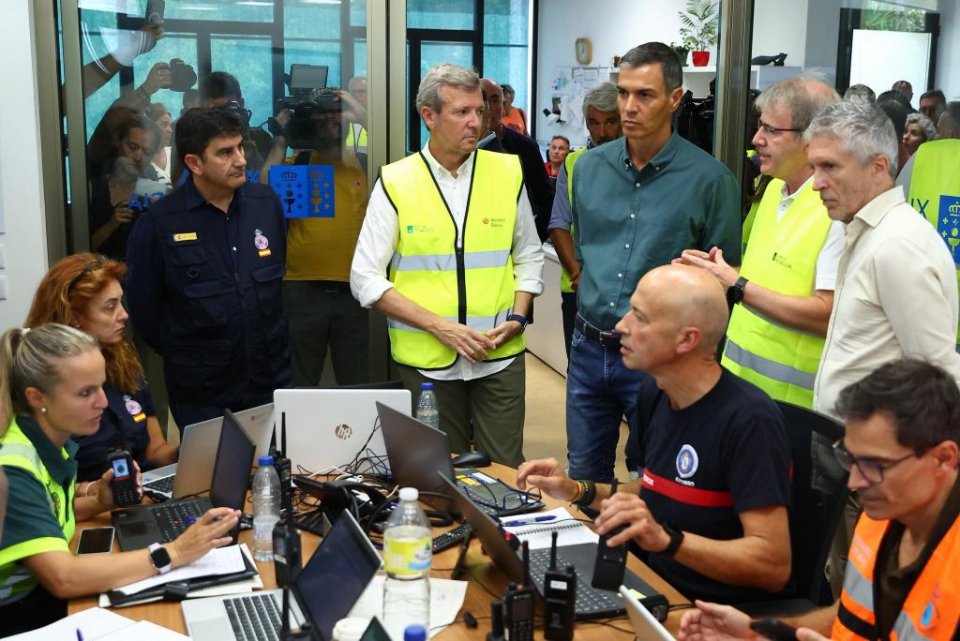Spanish Prime Minister Pedro Sánchez pledged on Sunday to forge a ‘national pact’ to confront the climate crisis during a visit to the wildfire-ravaged region of Galicia in the northwest of the country.
Spain is now in its third consecutive week of heat alerts, with fires still burning in the northwest and western provinces. Military units remain on the ground to support exhausted fire crews, while France and Italy have dispatched water-dropping aircraft to an air base near Salamanca (Castilla y León) to aid the response. ALSO READ: Second volunteer firefighter dies in Castilla y León region – third death from wildfires.
‘The government of Spain will work now so that in September we can have the bases of this national pact to mitigate and adapt to the climate emergency,’ Sánchez said while touring Ourense, in Galicia. He added that he intended to do ‘everything possible and even more’ to help those affected rebuild their lives.
Sánchez also said that an additional 500 soldiers would be mobilised, joining the more than 1,400 already deployed, to fight the blazes tearing through parched forests during the prolonged heatwave.
Officials are particularly concerned about outbreaks near Ourense, where 12 large fires are still burning, according to Alfonso Rueda, president of the Galician regional government.
‘Homes are still under threat so we have lockdowns in place and are carrying out evacuations,’ Rueda said. He noted that Galicia had been battling flames for over a week.
The worst-hit areas remain Galicia, Asturias, Castilla y León and Extremadura. With temperatures expected to stay extreme until Monday, the danger of further outbreaks remains high.
Travel has also been disrupted. Roughly 10 roads remain closed nationwide, and train services between Madrid and Galicia have been suspended. In Galicia, emergency services are issuing mobile alerts across dozens of towns:
‘If you receive this alert: remain calm and read the text carefully,’ the messages warn. ‘As the fires spread, avoid all unnecessary travel and stay indoors. If you are outside and have nowhere to stay, move away from the affected areas.’
Spain’s Emergency Military Unit (UME) now has some 3,500 personnel on active duty, but regional leaders are calling for even more. Alfonso Fernández Mañueco, head of Castilla y León regional government, urged the central government to provide ‘an exceptional response – we need more army personnel at the disposal of the regions’. Extremadura has also formally requested reinforcements.
In Spain, firefighting responsibilities rest primarily with the autonomous communities, with Madrid only stepping in during large-scale disasters.
The Spanish weather agency AEMET reported that temperatures would reach 45°C on Sunday, after Córdoba (Andalusia) registered 44.7°C on Saturday. According to the European Forest Fire Information System (EFFIS), more than 157,000 hectares have now burned across Spain since January.
Smoke from the Iberian wildfires has drifted as far as the United Kingdom, the UK’s Met Office confirmed. Scientists warn that human-driven climate change is making heatwaves more frequent, longer-lasting and more intense – conditions that fuel devastating forest fires.
Subscribe to the Weekly Newsletter from Spain in English.
📣O presidente @sanchezcastejon anunciou que o Goberno propondrá un gran Pacto de Estado fronte á Emerxencia Climática.
👉Xunto ao ministro do @interiorgob e o delegado @blancolobeiras, visitou en #Ourense o Centro de Coordinación Operativo para analizar a evolución dos lumes. pic.twitter.com/2HCmWvGSa7
— Delegación do Goberno en Galicia (@DelGobGalicia) August 17, 2025
Proponemos un gran Pacto de Estado frente a la Emergencia Climática.
Lo que está sucediendo nos interpela a todas las Administraciones Públicas, a los Grupos Parlamentarios y al conjunto del país.
Debemos responder de la mano de la Ciencia a la aceleración del cambio climático. pic.twitter.com/SbgzJqy78S
— Pedro Sánchez (@sanchezcastejon) August 17, 2025
Click here to get your business activity or services listed on our DIRECTORY.


